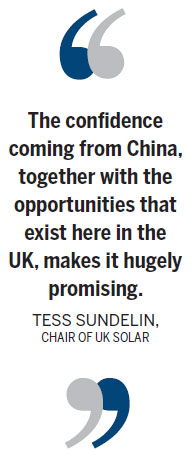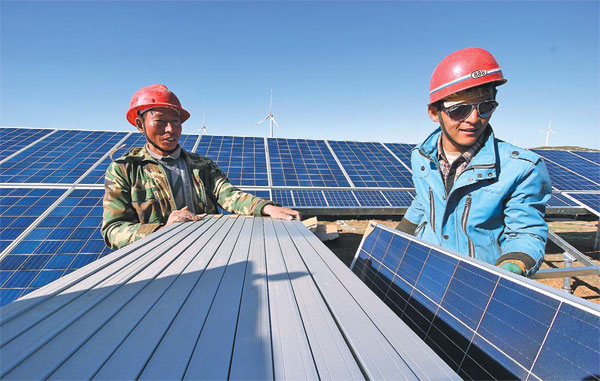It's not just solar panels

Chinese companies see opportunities to profit by investing in overseas projects
To reduce carbon emissions, Chinese companies are harnessing the power of the sun. To increase market share, they are strengthening collaboration overseas.
In Britain, China's solar panel manufacturers have shifted from only selling products to also investing in solar energy projects that will use their technology and components.
| Workers install solar panels at a photovoltaic power station in Weining, Guizhou province. To increase market share, China's solar panel manufacturers are strengthening cooperation overseas. Provided to China Daily |
"A lot of Chinese companies are really doing a phenomenal job and are betting on the right thing," says Tess Sundelin, chair of UK Solar, part of the Renewable Energy Association.
She says Chinese companies have foreseen the opportunities for investment in renewable energy, which is key to the growth of a modern country and economy.
"The confidence coming from China, together with the opportunities that exist here in the UK, makes it hugely promising," she says.
In June, Chinese solar photovoltaics manufacturer Znshine Solar signed a deal worth 400 million pounds ($680 million; 554 million euros) with MAP Environmental to develop projects in Britain that would generate a combined 400 megawatts in three years. The deal is the largest solar agreement signed by China and the UK.
The two companies, which will each contribute 50 percent of the investment, say the projects will create up to 50 new jobs in design, administration and operations, and another 500 in construction and maintenance.
Technicians from Znshine Solar and MAP Environmental will cooperate in project development and solar module supply, and will offer turnkey solutions across Britain, helping to cover social housing installations, commercial rooftops and ground-mounted solar parks, the companies say.
"We're proud to be cooperating with a valuable partner in supporting Britain's commitment to reducing its carbon footprint," William Wang, general manager of Znshine Solar, says.
The UK government has set a target to reduce carbon emissions by 80 percent by 2050.

The Znshine Solar deal came just a month after the international division of Aviation Industry Corp of China announced it will build more solar power plants in Britain to generate a total of 300 mW in three to five years.
"We're constructing the solar power plant using our own technology, materials and components," says Pan Linwu, executive vice-president of AVIC International.
In 2013, AVIC purchased Spriggs Farm for about 13 million pounds, and the next year handed it over to Foresight Solar Fund Ltd, an independent infrastructure and private equity investment manager based in the UK. The 50-hectare solar power plant generates 30,000 kilowatt-hours in the summer, the equivalent produced by 23 metric tons of coal a day, and supplies electricity to 2,500 households.
Industry insiders say strong support from the governments of China and Britain has led to a boom in solar power and facilitated cooperation.
China aims to more than triple its total solar power capacity to 100 gW by 2020, according to the National Development and Reform Commission.
Meanwhile, Britain installed more solar power facilities than any other European country last year and is on track to retain that ranking this year, although that has partially been due to a rush to complete projects before the end of subsidies.
The UK Department of Energy and Climate Change scrapped subsidies for large-scale projects - more than 5 mW - on April 1 in an effort to control state spending and support the nationwide deployment of mid-scale and rooftop solar PV.
In recent years, Britain's renewable energy sector has flourished, largely thanks to the solar panels market, sparking interest from Chinese investors.
"What's been happening across Europe in the last few years is that there has been government policy to stimulate the uptake of solar panels," says Ash Sharma, senior director of solar research at IHS Technology, who predicts that Britain's decision to cut subsidies will affect the market.
However, other experts say they expect the cooperation between China and the UK to continue as the countries attempt to cut carbon emissions, reduce air pollution and improve energy security.
Sundelin, who is also managing director of Green Hedge Group, one of Britain's leading developers of ground-mounted solar PV, says she believes there is a tremendous opportunity for China and the UK to work together.
"The UK and China are learning to work extremely well together, it is really encouraging," she says. "That huge opportunity is one that the UK will best realize if we continue to work closely together with the Chinese businesses that are active in solar."
Prior to Chinese investment in solar plants, the country's cooperation with Britain had focused on solar panels. China is the world's biggest manufacturer of solar panels.
"China has always been a very large supplier of solar panels, they have a big market share in most countries - and that's really why people started buying them in the UK, mainly because China is leading globally," Sharma says.
However, Sundelin says that as competition increased, profits became thinner, and Chinese manufacturers have sought opportunities to climb up the value chain and "make more money from their expertise and from the solar projects they are involved with".
Leonie Green, head of external affairs at the Solar Trade Association, agrees and adds: "There are clearly huge mutual interests; the pressure is on the renewables industry to deliver at the lowest cost, and with the exceptional efficiency of the Chinese pricing competitiveness, it is clearly in everyone's interest that we work together."
There are some challenges, she warns, such as the concern over what the European Union will do when the minimum import price agreements come to an end.
The EU and China agreed on a minimum import price for solar modules and cells from China in 2013, with EU measures against dumped and subsidized imports put in place until the end of this year.
Regardless of what is to come, Sundelin says China should be applauded for its solar panel technology.
"The Chinese have done a phenomenal job of making this technology more competitive with fossil fuels in terms of cost than anyone would have thought five years ago," Sundelin says. "Chinese companies have innovated, competed and brought down the cost of panels.
"It's important that we continue this cooperation."
Daniel Assab contributed to this story.
zhangchunyan@chinadaily.com.cn
(China Daily European Weekly 05/22/2015 page23)
Today's Top News
- Japan tempting fate if it interferes in the situation of Taiwan Strait
- Stable trade ties benefit China, US
- Experts advocate increasing scope of BRI to include soft power sectors
- New engine powers cargo drone expansion
- China to boost green industry cooperation
- Manufacturing PMI rises in November































